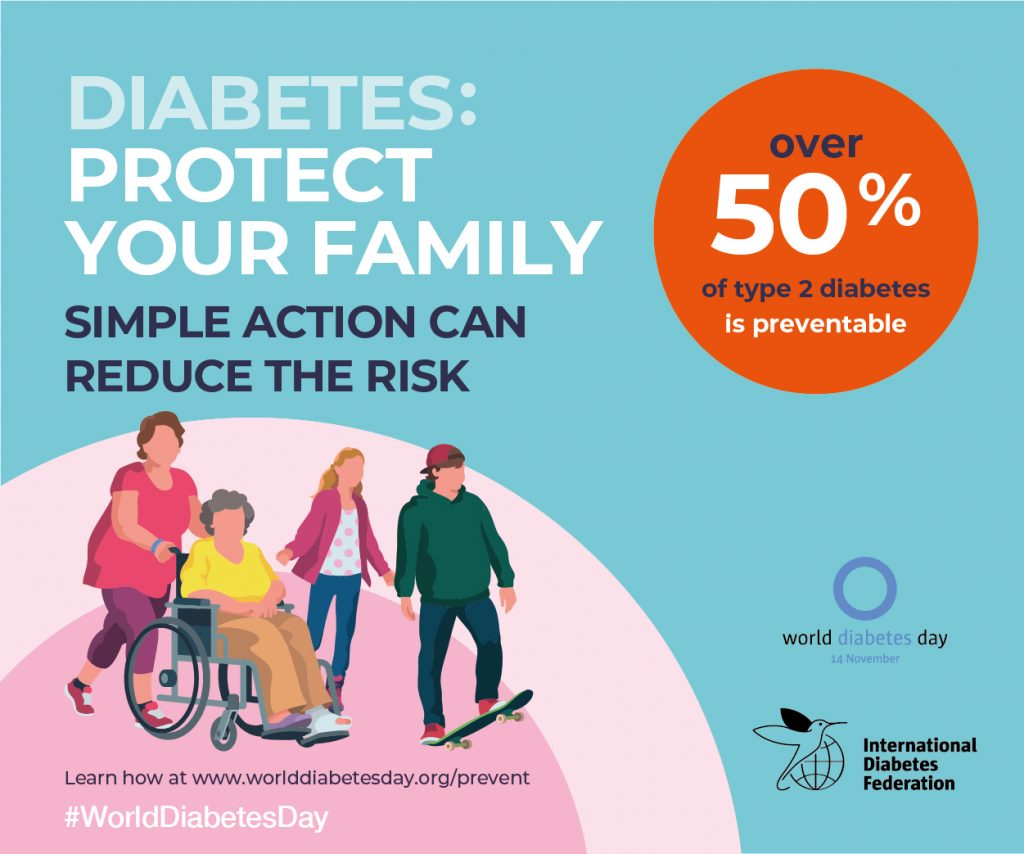World Diabetes Day 2019
by Maryanne Matthews
 This year, the theme for World Diabetes Day is Family and Diabetes. The IDF is raising awareness of the impact that diabetes has on the family and support network of those affected, and promoting the role of the family in the management, care, prevention and education of diabetes.
This year, the theme for World Diabetes Day is Family and Diabetes. The IDF is raising awareness of the impact that diabetes has on the family and support network of those affected, and promoting the role of the family in the management, care, prevention and education of diabetes.Every three minutes another Canadian is diagnosed with diabetes. Almost one in three Canadians has prediabetes or diabetes. Furthermore, 1.5 million Canadians have type 2 diabetes and do not even know it.
Each year, the International Diabetes Federation (IDF) recognizes November as Diabetes Awareness Month and November 14th as World Diabetes Day. This year, the theme for World Diabetes Day is Family and Diabetes. The IDF is raising awareness of the impact that diabetes has on the family and support network of those affected, and promoting the role of the family in the management, care, prevention and education of diabetes.
Diabetes is a chronic disease that affects the body’s ability to regulate sugar in the blood. If left untreated, diabetes can lead to high blood sugars. Over a period of time, diabetes can damage your heart, kidneys, blood vessels, eyes and nerves leading to serious health complications.
Prediabetes is a condition where blood sugar levels are higher than normal but not high enough to diagnose diabetes. Over half of people with prediabetes will go on to develop type 2 diabetes within 8-10 years without treatment.
There are three main types of diabetes:
Type 1 Diabetes affects 5-10% of people with diabetes. People with type 1 diabetes no longer make insulin, a hormone that helps the body use sugar, and require insulin injections to survive. Type 1 Diabetes usually affects people under 30 years of age but can occur in older adults. While the cause of Type 1 Diabetes is not well understood, there is an increased risk if you have a parent or sibling with the disease.
Type 2 Diabetes affects the majority of people diagnosed with diabetes, around 90%. People with Type 2 Diabetes do not make enough insulin, or are not able to effectively use the insulin that their body makes. Type 2 Diabetes usually affects adults but the rate of type 2 diabetes in children has been increasing in recent years. Some of the risk factors include being over the age of 40; having a parent or sibling with diabetes; being overweight or obese; having a baby that weighed over 9 lbs at birth or having a history of gestational diabetes; being a member of high risk group (Asian, African, Indigenous, Hispanic or low socioeconomic status); and, having high blood pressure or high cholesterol.
Gestational Diabetes occurs to women during pregnancy and usually goes away when the baby is born. However, if it is not managed, there can be health problems for both the mother and child. For those who have gestational diabetes, there may be an increased risk for the mother and child of developing diabetes.
Some risk factors for diabetes, such as our age or family history, can’t be changed. However, a healthy lifestyle can make a difference. For those with prediabetes, lifestyle changes can reduce the risk of developing diabetes by 60%. For those already diagnosed with diabetes, practicing healthy lifestyle choices, managing diabetes and its risk factors can reduce the risk for developing complications.
These are some activities to do to live healthy with diabetes or prediabetes:
- Eat a healthy diet. The kind of food you eat, how much, and when can all help to control blood sugars;
- Exercise regularly. Physical activity helps your body to control blood sugars, reduce stress and lose weight;
- Maintain a healthy body weight or lose weight. Even 5-10% weight loss can help to control blood sugars;
- Manage stress. Stress can cause high blood sugar and high blood pressure. Find healthy ways to manage stress such as exercise or socializing;
- Monitor blood sugars. Talk to your health care team about what blood sugars goals are right for you and how to you can achieve these;
- Maintain a healthy blood pressure. Elevated blood pressure can affect your heart, kidneys and eyes. Talk to your health practitioner about what blood pressure goals are right for you;
- Maintain a healthy cholesterol level. Speak to you practitioner about what cholesterol level is right for you;
- Take medications as prescribed. Medications may be needed to control blood sugars, blood pressure or cholesterol;
- Quit smoking. Smoking is bad for everyone but when you have diabetes, smoking increases your risk for developing complications;
- Stay educated on diabetes management. Connect with a care team that can help you to understand your diagnosis and treatment. Be an active member of your team by being involved with your care and understanding your health.
Support your family members with diabetes, improve your own health, and lower your risk of developing diabetes by adopting healthier lifestyle habits as a family.
For more information or assistance in managing a diagnosis of prediabetes or diabetes, you can contact Diabetes Health at (807) 344-3422 or the Hospital’s Centre for Complex Diabetes Care (by physician referral) at (807) 684-6944.